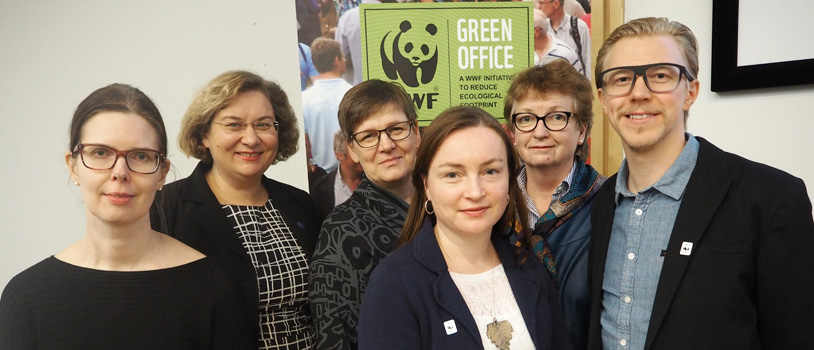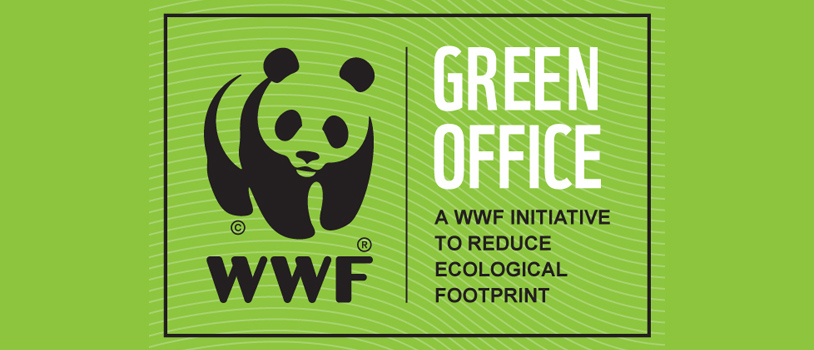
Green Office network meeting at Hansel: Responsible actions through procurement
In October, Hansel and WWF organised a network meeting to promote the exemplary procurement operations of Green Offices. Because responsibility is a key element in Hansel’s strategy, it was natural for the company to host the meeting.
Participants discovered that, for the first time, the government purchasing guide includes a section on responsibility. It provides instructions for determining goals and performing the actual work. A speaker from Hansel stressed that the Act on Public Contracts doesn’t by any means prevent the consideration of responsibility in public procurement. Quite the opposite; the act encourages sustainable acquisitions. Responsibility can also be taken into consideration in many stages of a procurement process, and it is especially important to ensure that continuous improvements during the contract period are possible.
“It is possible to take responsibility into consideration in tendering competitions, but this is not something that happens automatically – the customer has to demand it. Various elements need to be considered in the requirements set forth in a call for tenders, for example, but in such a way that none of the tenderers are favoured or discriminated against”, said Karolina Lehto, Legal Counsel at Hansel.
Choices that make a difference
“FSC certification ensures that the diversity of a forest is preserved – that trees of different ages and precious habitats are conserved”, said Annukka Valkeapää, who talked about responsible paper procurement.
In Hansel’s framework agreements, environmental aspects such as this are taken into consideration on behalf of the customer. Mikko Kuiri, who talked about WWF’s procurement of printed materials, pointed out that in environmental matters, you don’t have to run the whole course at one go – more responsible purchases can be made one at a time. Helka Julkunen, Green Office Programme Manager, reminded us that purchasers generate demand, and with increase in demand, the prices for environmentally healthy options will begin to decrease.
Isa-Maria Bergman promised that Motiva’s procurement service provides advice regarding sustainable purchases. The ecological procurement network gathers pioneers together to think about how additional value can be produced to the environment, society, and the economy, in addition to the organisation itself. It is important for the public sector to set an example in sustainable consumption. With so many purchases, it is of the essence to assess the importance of and prioritise various purchases.
“Strategic choices make it easier to achieve sustainable development goals. Energy-efficiency is one thing that has a huge impact. I recommend having a look at the www.ekosuunnittelu.fi website and international examples”, Bergman said.
Ecological ICT purchases are not all about matter
At the end of the Green Office meeting, Jyrki Kasvi gave an inspiring talk about the various perspectives to ecological ICT purchases. The improvement of efficiency through ICT technology, for example, is beneficial for the environment, too. The same goes for increase in capacity, which results in decrease in emissions. Heating expenses can be reduced with an IoT thermostat. It is not only the equipment that matters; good programming practices can also lower energy consumption and prolong the useful life of equipment.
“With the development of robotics, many things that once were not cost-efficient are now exactly that. Another matter to be considered is social responsibility – what if we can improve safety at work or reduce the need for humans to handle harmful substances?” Kasvi pointed out.
Key considerations regarding ICT purchases include the origin of raw materials, conditions of employment, industrial safety, and environmental effects. Total energy consumption during the life of a device, the recyclability of technology, and the ecologicality of software are also important matters.
“Efficiency is always ecological, and devices should not be left idling”, said Jyrki Kasvi as he summed up his presentation.

Hansel reducing its ecological footprint
Hansel is a member of the Green Office network in Finland, which includes 150 different organisations. Green Office is an environmental programme developed by WWF Finland. Its objectives include reducing the environmental burden caused by offices.
Read more >>



 Read next
Read next